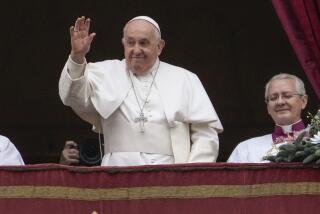Pope Decries Apartheid in Zambia Visit
- Share via
LUSAKA, Zambia — Landing in one of the capitals of anti-South Africa activity, Pope John Paul II on Tuesday delivered a strong anti-apartheid message, praising Zambia for its “commitment to protect and promote each individual’s rights.”
At the same time, the Pope acknowledged that poverty, which has struck as hard here as anywhere in Africa, threatens the strength of the church itself. And he also put in a strong word for inculcation by the church of the “obligations of marriage and family life”--this in a land where sexually transmitted AIDS may have infected as much as 20% of the urban population.
The Pope’s arrival from the French island of Reunion on an Air France supersonic Concorde--the first time a pontiff’s plane has broken the sound barrier and the first time the luxurious jet has landed in this country--may have suggested some unintended ironies.
For the standard of living may have fallen faster here since independence in 1964 than in any sub-Saharan African country not afflicted by war.
Staple Food Shortages
Shortages of such staples as maize, wheat and sugar are nearly constant. To keep their employees from spending most of their work days in line waiting to buy food, many foreign businesses and embassies buy staples in bulk and resell them to workers.
In recent months, the lines have turned ugly; on several occasions police have fired tear gas at wait-weary shoppers who were on the point of storming empty government shops.
The difficulties have focused more attention on the economic policies of Kenneth D. Kaunda, who has led Zambia since independence, creating a nation of remarkable political stability and equality but of economic decline. Kaunda has failed to develop Zambia’s potentially rich agricultural land, allowing the nation to become dependent on copper mining for 90% of its foreign income.
For all that, to the extent they touched at all on economic matters, the Pope’s homilies on his first day in Zambia focused more on the exterior causes of poverty in this area.
These include regional instability fomented by South Africa and perennially low prices for African agricultural exports.
“I am aware that events in this region in recent years, and world events beyond your control which affect all developing countries, have brought economic and social difficulties in their wake,” he said upon landing at Lusaka airport to a joyous welcome from a crowd of tens of thousands, tribal dancers, choirs and a military honor guard.
Both the pontiff and Kaunda acknowledged Lusaka’s status as headquarters of the African National Congress with firm denunciations of South Africa’s racial politics.
“We face the affliction of apartheid, an all-round human degradation declared by the international community as a sin against humanity itself,” Kaunda said in his welcoming speech.
While on the Indian Ocean island of Reunion earlier Tuesday, the Pope beatified a 19th-Century French missionary considered the apostle of the island’s slaves, the Associated Press reported. The beatification represented a first step towards possible sainthood for Jean-Bernard Rousseau, known as Brother Scubilion, who died in 1867. Rousseau spent 34 years on the island, teaching catechism to the African slaves taken to the island by the French colonists.
More to Read
Sign up for Essential California
The most important California stories and recommendations in your inbox every morning.
You may occasionally receive promotional content from the Los Angeles Times.













